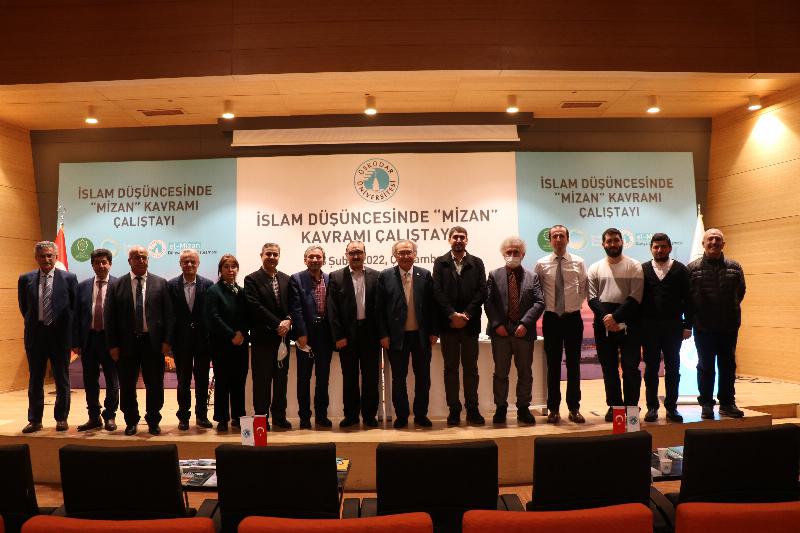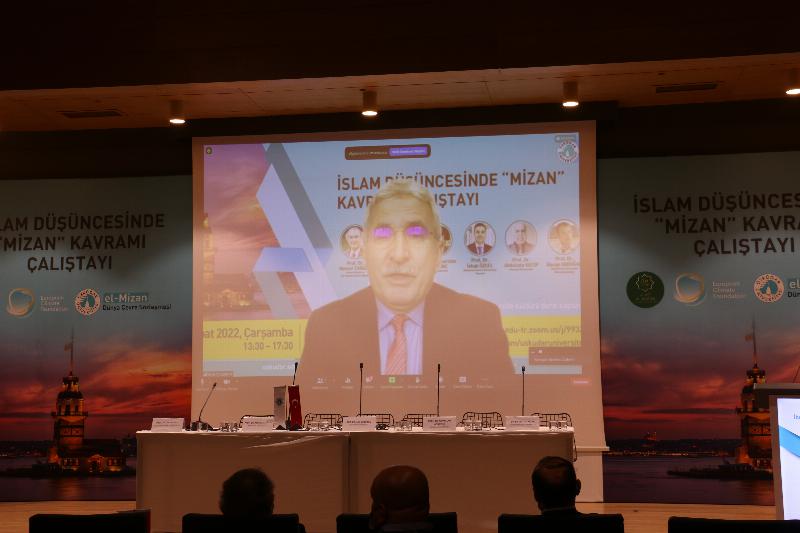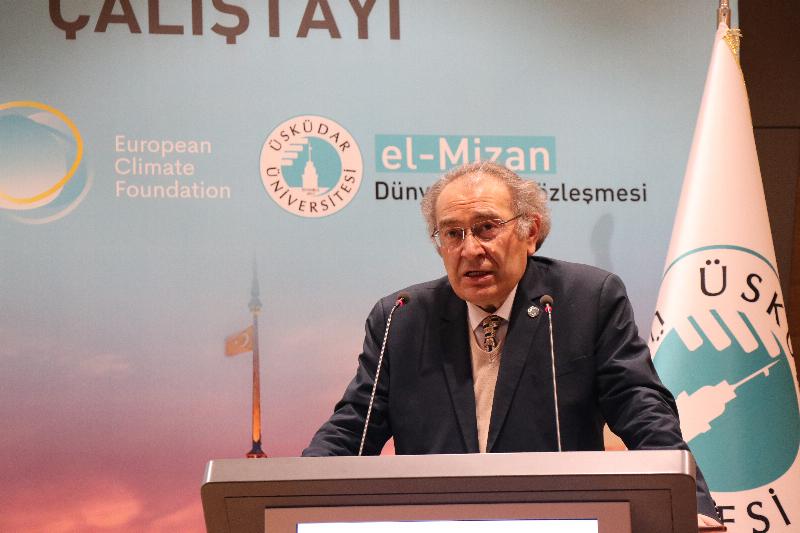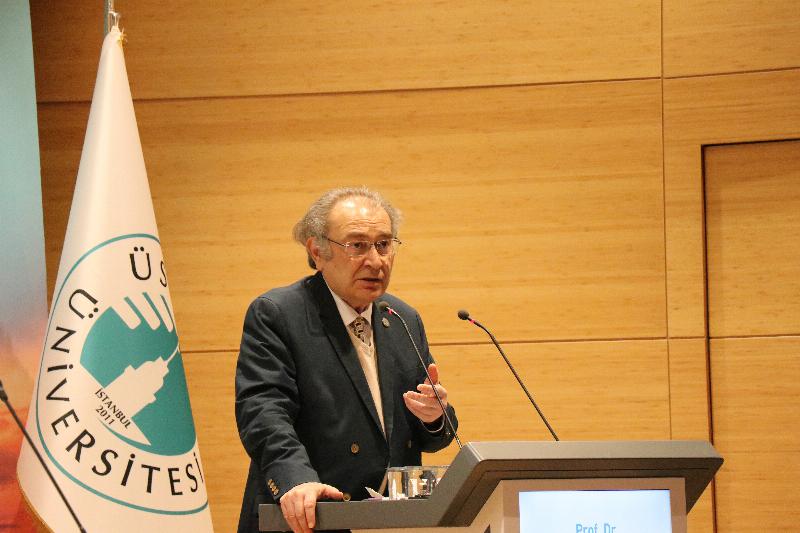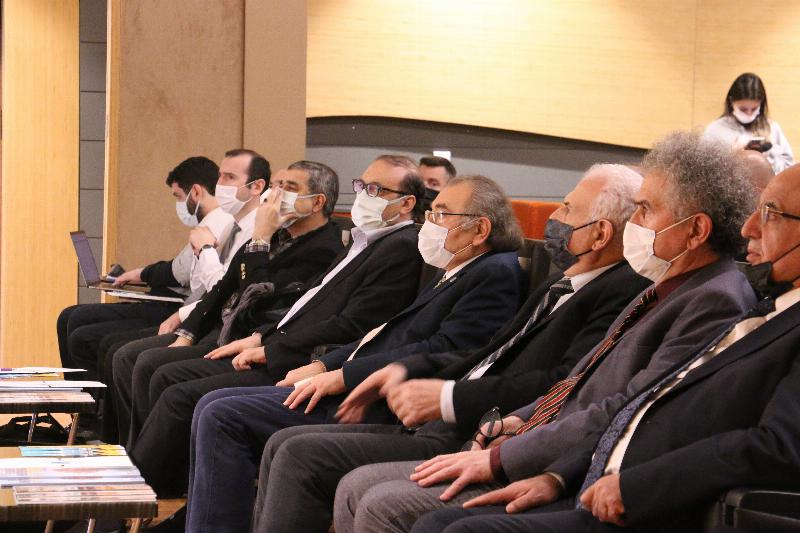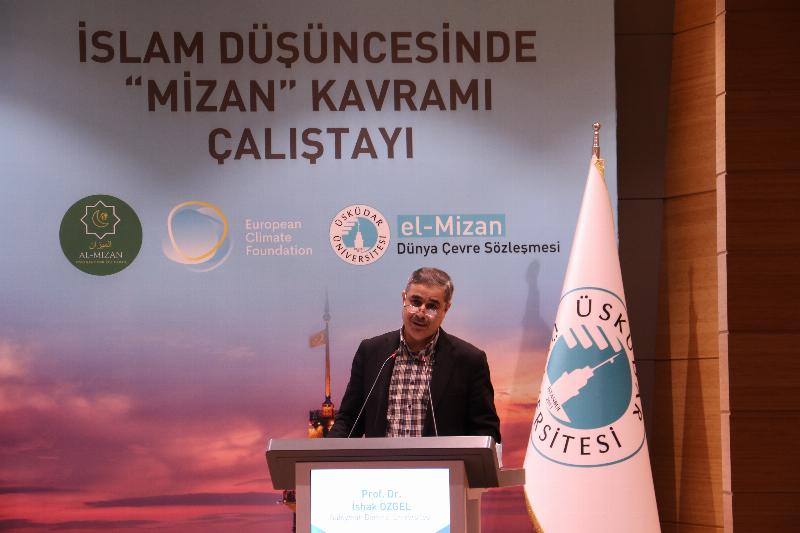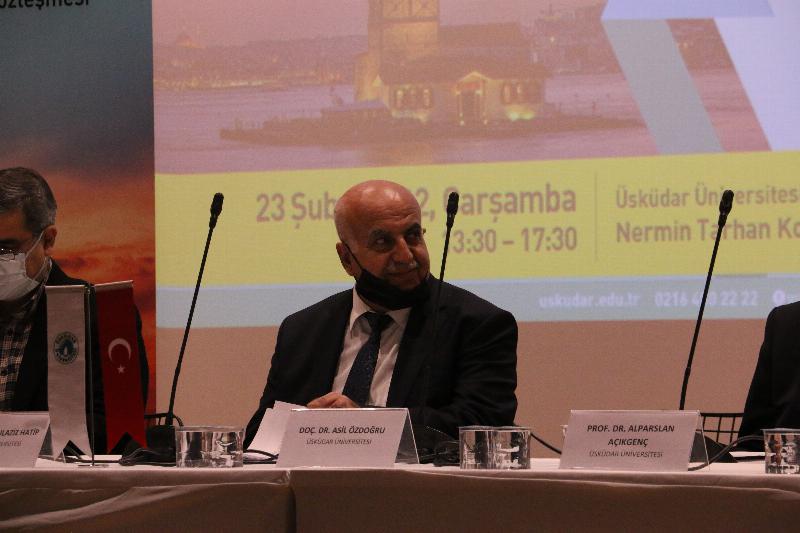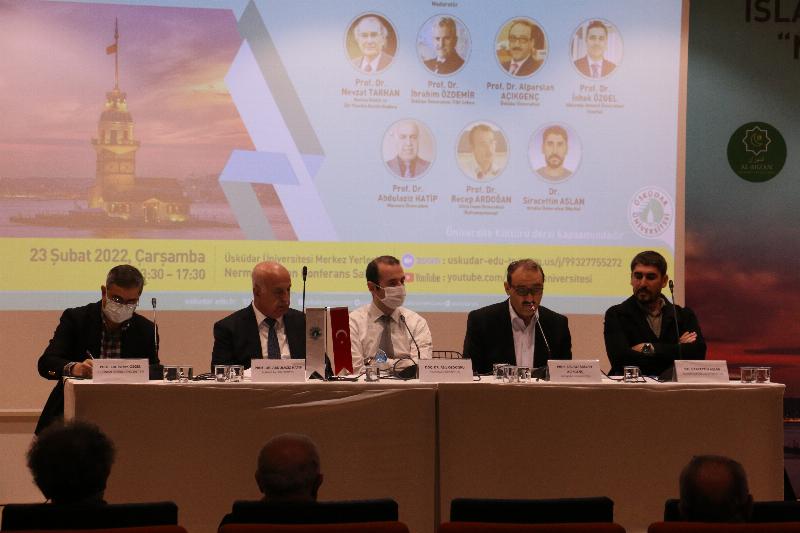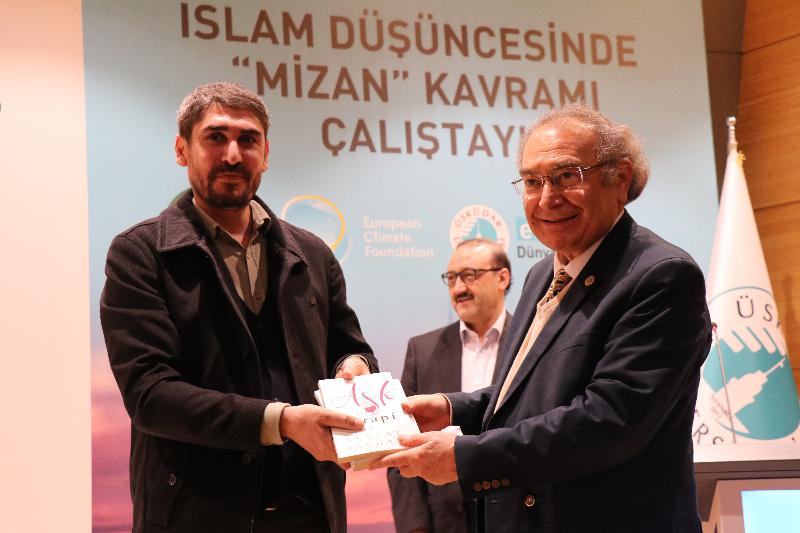Workshop, Concept of 'Mizan' in Islamic Thought, Uskudar University
Stating that those who talked about climate change, global warming, and global pollution were seen previously as idealists, Psychiatrist Prof. Dr. Nevzat Tarhan said, “Now, it is necessary to look at these people as realists, instead of idealists”. Pointing out that people should be both merciful and just when approaching nature. Then Prof. Tarhan noted that with modernism and the capitalist system, the balance of compassion and justice concerning the issue of respect for nature has deteriorated. Prof. Tarhan added that selfishness, which he defines as the most important disease of this century, is a malaise that destroys nature.
The concept of Mizan was evaluated by experts from different universities in Turkey at the Workshop on the Concept of “Mizan” in Islamic Thought, organized by the Faculty of Humanities and Social Sciences at Uskudar University.
Prof. Dr. Ibrahim Ozdemir: “Mizan is one of the main concepts of the Qur'an”
The opening speech of the workshop held at Uskudar University Central Campus Nermin Tarhan Conference Hall was made by Prof. Dr. İbrahim Ozdemir Dean of Uskudar University Faculty of Humanities and Social Sciences. Attending the workshop online, Prof. Ozdemir, in his opening speech, mentioned that the UN Environment Program international meeting held in Nairobi was ongoing simultaneously during the workshop.
Referring to the reasons why they chose Mizan as the subject of the workshop, Ozdemir said, “The reason we chose the concept of Mizan is because it is one of the main concepts of the Qur'an. “Mizan” is used 9 times in the Qur'an. In Surah Rahman, the importance of Mizan is emphasized 4 times in a row. It is almost ingrained in our minds. Thus, from the time the Qur'an was first revealed, it encouraged Muslims to read nature as well as itself which is revelation deciphers the key concept in reading nature.”
Prof. Dr. Nevzat Tarhan: “Humanity disrupts the balance of nature”
The President of Uskudar University and Chairman of the Executive Board Prof. Dr. Nevzat Tarhan assessed ecological psychology in his opening speech.
Noting that at this point the world has reached present, people treat nature crudely, Prof. Tarhan said: “The most common situation in nature is the disappearance of forests due to deforestation. On the other hand, there is global warming and melting glaciers. There has also been a serious decrease in water resources. In some areas there are droughts and in others floods. Natural disasters have increased significantly in nature compared to the previous century. This means that when the balance in nature, which we call the homeostatic balance, is disturbed from one place, it erupts in the form of the disease from another place. Humanity is disrupting that balance.”.
Prof. Dr. Nevzat Tarhan: “If projects are not established in a social and cultural context it will not work”
Pointing out that those who talked about climate change, global warming, and global pollution before were only seen as idealists, Prof. Tarhan said: “Now, it is necessary to look at these people as realists, instead of idealists. This work, which combines environmentalism with our cultural and belief resources in the context of Mizan, is very valuable because if you cannot put a good project in the social and cultural context, it will not work. For this reason, we can say that in terms of establishing the cultural context of this work, Mizan in other words a measure and balance in the universe, is very important in terms of being a message to human beings who disrupt the balance and bringing it to the fore is of vital importance.”
Prof. Dr. Nevzat Tarhan: “We cannot treat without making a correct diagnosis”
Pointing out that we are at a very important time to discuss the emergence of global warming, climate change, and deforestation, Prof. Tarhan said: “There is also the United Nations' decision on this issue, in which Turkey has also signed this agreement. Presently the Ministry of Environment, Urbanization, and Climate Change have been established. In this context, we cannot treat it without asking the question, 'Why has the environment deteriorated?' and making a correct diagnosis. Why hasn't there been such a big disruption until now? There is always technical information such as ozone layer depletion, warming of the atmosphere, the emergence and accumulation of greenhouse gases in cities.”.
Prof. Dr. Nevzat Tarhan: “There is serious electromagnetic pollution”
Noting that there is serious electromagnetic pollution that is not noticed today, Prof. Tarhan said: “This pollution should be handled as an agenda within the scope of environmental pollution. Electromagnetic pollution is not visible. Electromagnetic particles and waves circulate in our environment. Having this at a certain intensity is acceptable in terms of health. When it exceeds a certain limit, it starts to cause harm just like dust. Currently, present among us, Prof. Dr. Osman Cerezci and Prof. Dr. Selim Seker have important studies in this area. They express these viewpoints themselves. Having airborne dust particles are natural in a normal environment, but not in an operating room. It should be a clean room, zero particles, not a single microbe in the air because it will cause harm.” he said.
Prof. Dr. Nevzat Tarhan: “The relationship between humanity, environment, and nature is very important”
Stating that there is a basic scientific measure regarding global pollution, Tarhan said: “If we do not protect this earth, we will inflict the utmost harm on our grandchildren. Maybe we will not feel it very closely, but our children and grandchildren will feel it. We should not make children say, 'Shame on our grandparents'. For this, human behavior is very important. The relationship between humanity, the environment, and nature, which affects human behavior, is very important. It is necessary to establish this relationship correctly. There is a balance of nature and nurture in humans. There is the naturally occurring environment that we call nature, and there is also the artificial environment and urbanization, which is defined as nurture. When we say environment, we only understand the artificial environment. We think of the environment as the city we live in. But there is also the natural environment, and human behavior and decisions change that”.
Prof. Dr. Nevzat Tarhan: “People should question the damage they cause to the environment”
Prof. Tarhan explained that bees are pollinators and continued his words as follows:
“Only wind and bees can pollinate in nature. But wind alone is not enough. A bee visits up to 400 flowers a day to return to its beehive, and it provides magnificent pollination. The results of mathematical modeling of what will happen to the world when the bees disappear and what will happen to the world when humans disappear is thought-provoking. It has been concluded that when the bees disappear, the whole world will become a desert in about 50 years and there will be no green areas left. Since there is little pollination, the world could consume itself in 50 years. When people disappear, it was concluded that the world would become like Chernobyl in 50 years. Chernobyl happened in 1986, and since then people have not been there. Even the walls of the buildings are now overgrown with greenery. It has become more beautiful since people left Chernobyl. Man is not a product of nature; he is a guest in this world. The purpose of human existence in the world is also different. People need to question how they harm the environment and the world they live in.”
Prof. Dr. Nevzat Tarhan: “The Age of Enlightenment damaged nature.”
Emphasizing that the Age of Enlightenment harmed nature without realizing it, Prof. Tarhan said: “Currently, we are experiencing the negative consequences of the age of enlightenment. Philosophical discourses with the approach of "nature is our rival" were developed. When we say that nature is our rival, it is as if we must defeat and dominate it, and the philosophy of destroying nature was conceived. Instead of the philosophy that previously respected nature, a trend that destroys nature and says that it has the right to destroy had emerged. As a result of that trend, we started to behave crudely towards nature. However, in the geography of our civilization and Asia, there is respect for nature. Cities are green. On the other hand, there are no trees inside old cities in Europe. For example, there is not a single tree in Toledo, but there are places that they were planted in later. Old European cities are treeless, but Ottoman cities are green. This is an important sign that shows the cultural dimension of a civilization's respect for greenery. It is said that there are 3 enemies of forests, the ax, fire, and goats. The cause of these three enemies are all human, so we have to use these three correctly”.
Prof. Dr. Nevzat Tarhan: “The disease of selfishness is the most important disease that destroys nature.”
Stating that managing the forest is also related to the basic principles of resource management, Prof. Tarhan said: “While monetary resources are managed, input and output control is done in line with the needs, while the pool is enlarged and a healthy placement following the target is realized. After that, it would be a wise investment. In Arabic, the word economics (İktisad) is derived from the root purpose (maksad). If a resource is to be managed, the purpose must first be determined. The human-environment relationship is also very important. In the relationship with the environment, it is necessary to act with the logic of resource management. We need to manage the relationship with the environment in the same way we manage financial and social resources wisely. If we cannot establish meaningful relationships with the environment, then we cannot be nature-friendly thus reflecting our selfishness. The most important disease of this century is selfishness. Selfishness is the most important disease that destroys nature. It is disrespectful to nature and against animal rights to hunt for fun and to take animals and imprison them in zoos. Many things need to be re-examined”.
Prof. Dr. Nevzat Tarhan: “The relationship with the environment is just as important as our relationship with money.”
Stating that one of Prophet Adem's daughter's name is reported to be Iklima and that climate (iklim) is derived from this word, Tarhan said: "We have a culture that cares about the environment. We must not lose this culture and should reactivate it. Human beings are behaviourally born prematurely into the world, but animals are born learned at birth. A duck can swim as soon as it is born. A person, on the other hand, becomes self-directed only at the age of 15 and becomes able to walk at the age of one. People are born to learn. Therefore, it is necessary to teach environmental awareness in education. The relationship with the environment is not less important than the relationship with money. The capitalist system sees money as the most important value. However, the environment also holds important value. Although it is just beginning to be understood, this is an important chance for the world. This opportunity should be used well. At Uskudar University, we have achieved a first in this regard. The el-Mizan document, supported within the scope of the United Nations project, is an international confirmation of this success. We have been given the opportunity to lead the way in this issue in the Islamic world. We aim to present the information obtained from the el-Mizan symposium into a book and present it to the scientific world. There is no environmental transformation without mental transformation. First of all, it is necessary to eliminate the question marks in people’s minds”.
Prof. Dr. Nevzat Tarhan: “When people embrace nature, they will become both merciful and just”
Stating that there are two kinds of relationships in the relationship of humankind with the environment, Prof. Tarhan said: “Firstly, they have a relationship with place and its immediate surroundings, and secondly, they have a relationship with nature. In both of these, there is the concept of justice and mercy in people. This is also referred to as love and discipline in psychology. The dimension of love and discipline is important in a person's behavior. The reflection of this on society is in the form of justice and mercy. One will be both merciful and just as one approaches to nature. When justice is achieved there will be a balance. Any more or less will harm the balance and justice; to be able to take from nature as necessary, to be able to use nature as much as necessary. Modernism and the capitalist system have seriously corrupted justice and measure. It upsets the balance of mercy and justice. It violates the respect for nature”.
After the opening speeches, the workshop was moderated by Uskudar University Psychology Department Faculty Member Assoc. Dr. Asil Ozdogru.
Prof. Dr. Alparslan Acikgenc evaluated “the concept of Mizan in the philosophical tradition”.
Uskudar University Department of Philosophy Lecturer Prof. Acikgenc discussed the concept of balance in Islamic civilization and Chinese civilization in his presentation titled "Mizan in the Philosophical Tradition ". Prof. Acikgenc said: “If there is no Mizan, that is, if there is no balance in existence, there will also be no life. Mizan is perceived as the spirit of life. He considers the scale to be necessary for a free-willed action that makes up a deed. This, on the other hand, is a purposeful activity presupposed by a willing agent who has the power of speech, which means speaking rationally. Balance is expressed in the first place, with the balance that the Qur'an establishes between the life of the hereafter and the life of this world. The Mizan, which includes a living process, is derived from the word “wazana” which means “to weigh” in Arabic. Then Prof. Acikgenc stated that the doctrine of yin and yang in Chinese philosophy also corresponds to the concept of Mizan as it tries to explain the change based on the balance established with a balance between these two principles.”
Prof. Dr. Ishak Ozgel: "Mizan is used in 4 main subjects in the Qur'an"
Professor at Suleyman Demirel University. Prof. Ozgel, in his presentation titled “The Concept of Mizan in the Qur'an”, said: “If the environment is viewed only as a habitat in which we can live and breathe, humanity is outraged when a loss or damage occurs there. The purpose of using the concept of Mizan is as follows; There is a scale with two sides, which means that what is on one side and what is on the other side are in balance. The word Mizan and its roots are used in 4 main subjects in the Holy Quran. First; the religion, that is, the revelation sent with the prophets, included the Mizan, and it was named as Mizan, the second; If there is creation, there is a Mizan (balance) in everything, third; the behavior that a person must do to reveal his personality, that is, their humanity in their relationship with people, includes Mizan (balance), and the fourth is that deeds will be weighed with Mizan (balance) in the hereafter. These 4 topics give clues about how to look at the Mizan (balance). We see the use of the Mizan in matters of religion, the universe, human beings, and the hereafter.” he said.
Prof. Dr. Abdulaziz Hatip: "Islam is a civilization of compassion and mercy"
Prof. Hatip from Marmara University, in his presentation titled “The Relationship between Divine Mizan (Balance) and Faith in the Universe", said that balance and harmony are always emphasized in the verses of the Qur'an about the Mizan. Emphasizing the value and importance that Islam attaches to the environment, Prof. Dr. Abdulaziz Hatip said, “Islam is merciful in every aspect. It is a civilization of compassion. Animals are not deprived of affection. In it, compassion and good treatment for animals are not left in words but are bound to certain rules. In this regard, there is no civilization like Islamic civilization”.
Prof. Dr. Recep Ardogan discussed the concept of Mizan in contemporary Islamic thought.
Prof. Ardogan from Kahramanmaras Sutcu Imam University, in his presentation on “The Concept of Mizan in Contemporary Islamic Thought", said: "Although the concept of subject (kul) rights in Islam first reminds us of the concept of human rights, the concept of subject rights also includes the rights of not only living people but also future generations, and also the rights of not only humans but also other living things on our planet.” Prof. Ardogan, giving examples from various verses in the Qur'an, said that the word Mizan carries the meanings of justice, the hereafter, and scales.
Dr. Siracettin Aslan examined El Hazini's Mizan'ul Hikmet work.
Dr. Aslan from Mardin Artuklu University, on the other hand, gave examples from the work of Islamic scientist El Hazini called “Mizan'ul-Hikme” in his presentation titled “Humankind, Nature, and Mizan in the Tradition of Islamic Science”. Dr. Aslan said that: “In the very beginning of the work, attention is drawn to the ontological connections between wisdom, ingenuity, justice, the hereafter, the world, order, religion, and virtues. Hazini says that access to virtues will be possible with wisdom.”
The workshop, broadcast live on UU TV and Uskudar University's official Youtube account, ended with the participants taking a group photo.
Translation: Ali A. Acikgenc, Ilayda Tuter
Üsküdar Haber Ajansı (ÜHA)
